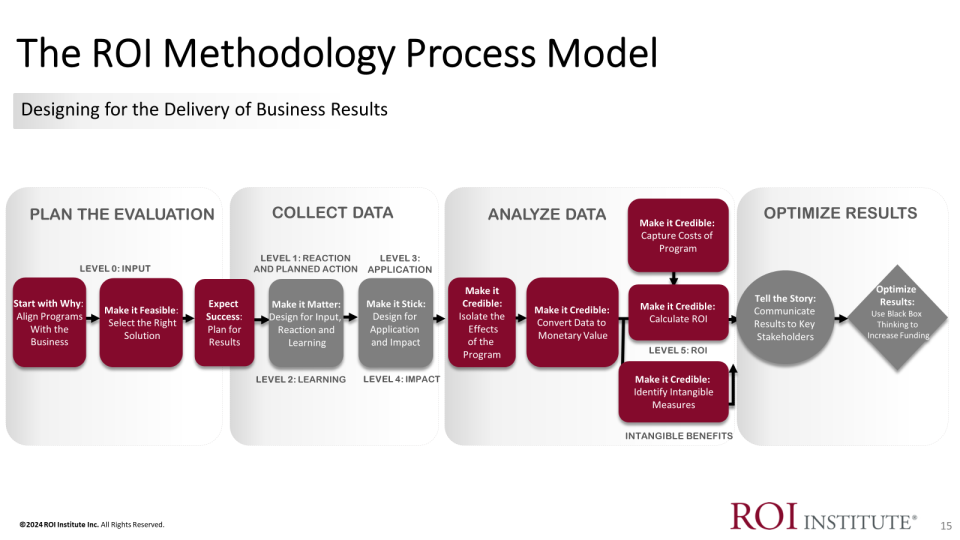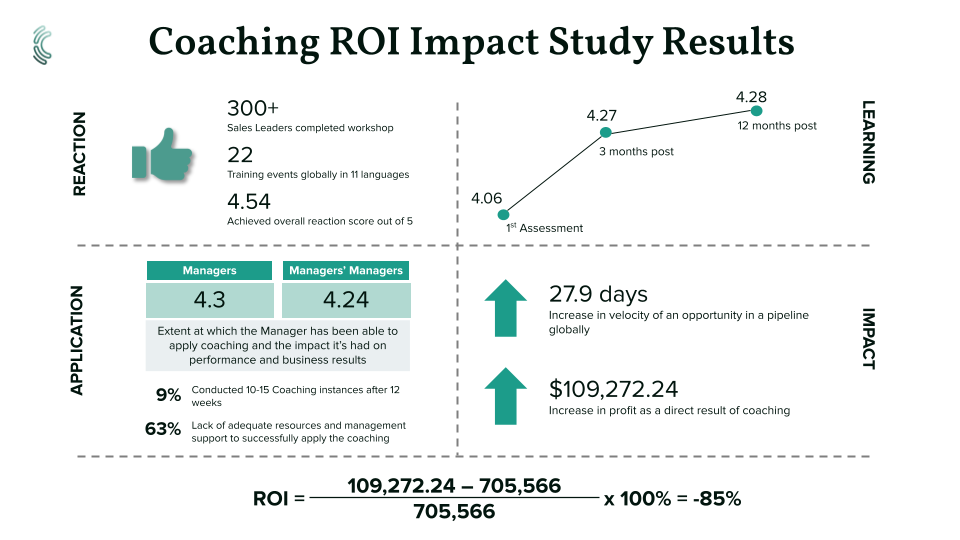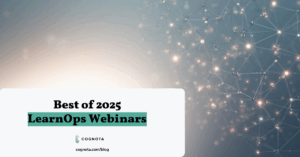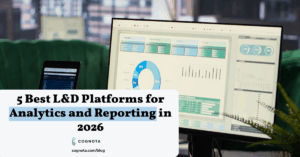On Wednesday, March 20, 2024, Cognota co-hosted a webinar with ROI Institute, Data-Driven L&D: Leveraging Measurement for Decision-Making and Learning Operations, that explored the ongoing transformation in L&D, measurement, and decision-making.
Cognota founder and CEO Ryan Austin was joined by Patti P. Phillips, Ph.D., CEO of ROI Institute; Katharine Aldana, Associate at ROI Institute, and Kaycee Buckley, Director, Global Commercial Talent at Abbott.
The event started with a big-picture overview of the opportunities that lie ahead for L&D, especially as the function is currently undergoing a significant overhaul. These far-reaching changes are expected to continue in the wake of the Great Reset, as organizations need to address increasing knowledge gaps while ensuring that the workforce’s skills align with both current and future business objectives.
Corporate training is broken
Dr. Phillips of ROI Institute proceeded to discuss how multiple corporations believe that the corporate learning function is broken and needs to be re-evaluated. She pointed to an example set by ByteDance, the parent company of TikTok, that decided last year to dissolve its talent development team.
“Previous initiatives were considered “self-indulging and ‘doing things for the sake of doing things’, where the actual value was limited and questionable,” was TikTok’s rationale for eliminating the corporate training function.
Rather, Dr. Phillips pointed out, learning needs to be deeply integrated with an organization’s strategy and core talent processes, citing McKinsey analysis. Deeper alignment with business functions will ensure training success. Dr. Phillips cited additional findings by Allied Market Research, which found that only 15 percent of learning is successfully applied on the job.
Getting buy-in by delivering the numbers
Katharine Aldana of ROI Institute took the floor to demonstrate how measurement of L&D program development and success will be key for all business stakeholders, as laid out in the ROI Institute’s process model.

The ROI Methodology Process Model is designed for the delivery of business results. The four steps begin with planning the evaluation, including “asking the why” to fully understand that the program will be aligned with the business. It’s also imperative in this step to understand that the evaluation will be feasible, similar to the “A,” or Achievable, in S.M.A.R.T. goal setting.
The next two steps in the Process Model include collecting and analyzing the data, as would be expected. However, Aldana made it clear that L&D leaders need to “Make It Matter” and “Make It Stick,” to ensure that the data will be relevant for later measurement and impact.
Finally, of course, the data needs to be optimized to “Tell the Story” to key stakeholders, for them to fully understand the results and what they mean for the organization.
“Data quality leads to decision quality,” emphasized Aldana.
Use in the real world
Kaycee Buckley of Abbott took the floor to provide a real-world application of this strategy—demonstrating an eye-popping -85% ROI. Yes, a negative ROI.
At first, Buckley was hesitant to present this number but later decided to present the results anyway. This was because of the time commitment of the 300+ participants and a few of the stronger results: a 28-day improvement in the velocity of sales opportunities and an increase of more than $109K in profit.
Luckily, Buckley’s director and division VP noticed the silver lining: if 9% implemented the coaching instances, which correlated to the $109K in profit, the director and VP asked, well what if 50% implemented the coaching—imagine how much greater the profit would be.
This actually led to an increase in investment in training, because senior leaders felt confident in the methodology and became focused on improving results.

Putting it all together for impact
Finally, Ryan Austin, CEO of Cognota, discussed the need to have the right technology in place to unite existing processes and formalize those that were previously ad-hoc or completed via disparate tools.
With a unified learning operations or LearnOps strategy in place, data, analytics, and insights are accessible to all who touch the learning function—from designers to subject matter experts to business unit leaders. In this way, there can be mutual agreement on measurement and KPIs so that impact can be measured more intuitively and comprehensively, and stronger, more effective decisions can be made.
As the first and only operations platform built specifically for L&D teams, Cognota’s LearnOps platform brings the entire learning workflow into one platform. In addition to saving time and realizing cost efficiencies, learning leaders get auto-generated insights into the performance of their teams and the learning needs of their entire organization.
By leveraging a LearnOps platform, organizations can access diverse tools and methodologies to tackle today’s complex challenges.
Get started with a free LearnOps consultation. Book a demo today!
If you’d like to hear the expert’s opinions in full, check out the on-demand recording of the webinar here.




